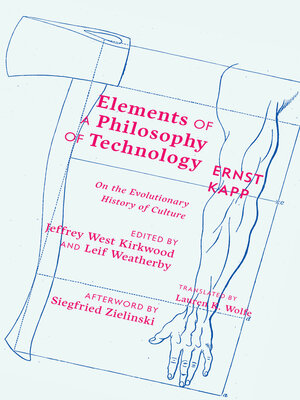Elements of a Philosophy of Technology
ebook ∣ On the Evolutionary History of Culture · Posthumanities
By Ernst Kapp

Sign up to save your library
With an OverDrive account, you can save your favorite libraries for at-a-glance information about availability. Find out more about OverDrive accounts.
Find this title in Libby, the library reading app by OverDrive.



Search for a digital library with this title
Title found at these libraries:
| Library Name | Distance |
|---|---|
| Loading... |
The first philosophy of technology, constructing humans as technological and technology as an underpinning of all culture
Ernst Kapp was a foundational scholar in the fields of media theory and philosophy of technology. His 1877 Elements of a Philosophy of Technology is a visionary study of the human body and its relationship with the world that surrounds it. At the book's core is the concept of "organ projection": the notion that humans use technology in an effort to project their organs to the outside, to be understood as "the soul apparently stepping out of the body in the form of a sending-out of mental qualities" into the world of artifacts.
Kapp applies this theory of organ projection to various areas of the material world—the axe externalizes the arm, the lens the eye, the telegraphic system the neural network. From the first tools to acoustic instruments, from architecture to the steam engine and the mechanic routes of the railway, Kapp's analysis shifts from "simple" tools to more complex network technologies to examine the projection of relations. What emerges from Kapp's prophetic work is nothing less than the emergence of early elements of a cybernetic paradigm.







